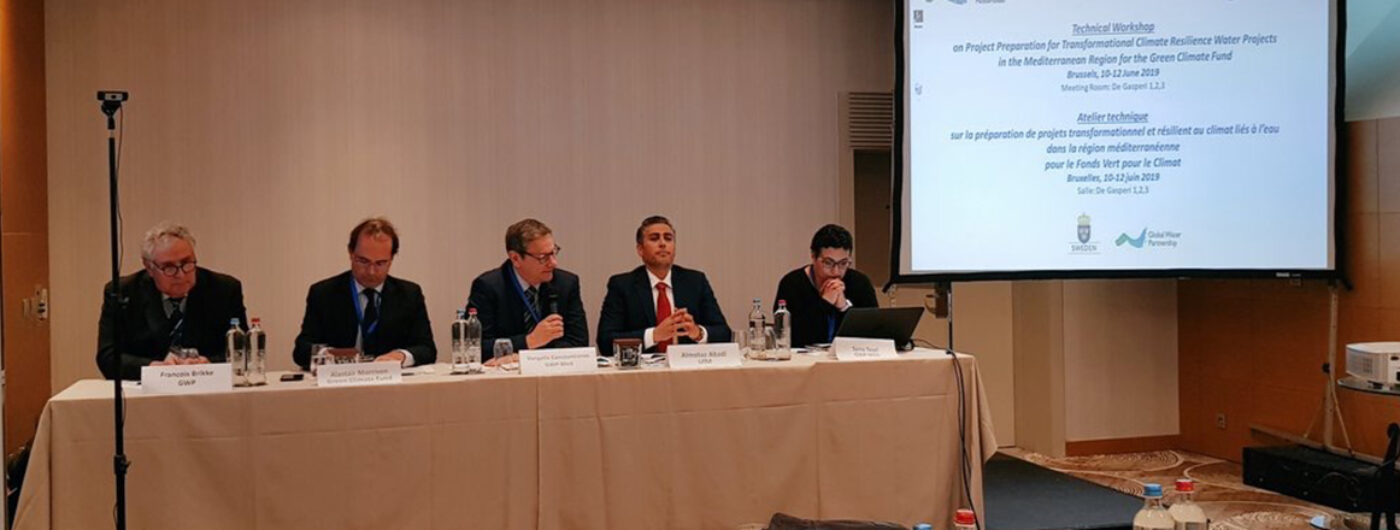
New steps towards a Mediterranean partnership for climate resilience water project
Brussels, 11 June 2019. The UfM organized on 11 June 2019 its first technical Workshop on Project Preparation for Transformational Climate Resilience Water Projects in the Mediterranean Region for the Green Climate Fund. The Mediterranean is one of the 25 climate change hotspot cuasing water scarcity, demographic change including concentration of economic activities and population in coastal areas, changing consumption patterns with growing energy needs and reliance on climate-sensitive agriculture, etc. The region is expected to face even more severe climate‑related vulnerabilities, such as extreme weather events like droughts and floods, increase of soil erosion and desert areas, sea level rise, etc., resulting to a range of negative economic, social and environmental impacts.
In response to these, the Mediterranean countries, both from Middle East and North Africa (MENA) and Southeastern Europe (SEE), and in accordance to the UfM Water Policy Framework of Action 2030 have requested strengthening capacity of responsible national authorities and entities to access international climate financing instruments and to be assisted preparing climate resilience water projects, including to address challenges in the mainland and the coastal areas.
Vangelis Constantianos, CEO of GWP-Med, had stated that this activity is part of the Med Water Matchmaker Project Making Water Cooperation Happen in the Mediterranean’ and contributes to the GEF UN Environment/MAP Project on ‘Enhancing regional climate change adaptation in the Mediterranean Marine and Coastal Areas’. And is an integral part of the Implementation of the UfM Water Policy Framework of Action 2030. The Workshop is organized by UfM, GWP-Med and GWP, with financial support by Swedish International Development Cooperation Agency (SIDA) and the GWP-O Water.
Almotaz Abadi, Managing Director of Water at the UfM stressed that the Workshop responds to the needs from MENA and SEE countries and expressed demand for strengthening capacity of Water Ministries as well as the National Designated Authorities (NDAs) and Direct Access Entities (DAEs), to prepare climate-resilient water projects that can access GCF financing. The activity is financially supported by Swedish International Development Cooperation Agency, Sida.
Specifically, Abadi also announced that the Workshop aims to present the GCF, its mandate, investment criteria, and its operational modalities and procedures for delivering climate finance to water initiatives through different windows; to discuss GCF financing instruments, along with fit-for-purpose examples of climate rationale, paradigm shift, project design, and financing instrument selection in the Mediterranean context, tackling priorities of MENA and SEE countries; to discuss methodologies for articulating incremental costs of climate-proofing water projects; to review challenges and constraints, and explore solutions for DAEs to coordinate with NDAs, and ministries in charge of water and water-related sectors in the preparation of GCF projects and identify opportunities and follow-up activities for GCF Project Concept Note preparation in line to the objective 10 of the Financial Strategy of the UfM Water Agenda focuses on ‘Use resources from international financial partners strategically to leverage other sources of finance’ and suggests ways to mobilize these. Furthermore, responding to Thematic priorities, UfM countries have encouraged the development of W-CCA projects presenting mitigation-adaptation co-benefits, including through the implementation of WEFE Nexus approaches and as a contribution of addressing WEM challenges.
The Workshop brought around the table participant from eleven countries of the UfM member states including Albania, Algeria, Egypt, Jordania, Lebanon, Libya, Mauritania, Montenegro, Morocco, Palestine, Tunisia- collectively discuss their priority project ideas and had concretely requested to put in place a partnership to assist the country to develop water projects from the Climate resilience portfolios specifically the Med region is the least country benefiting from these portfolios.

